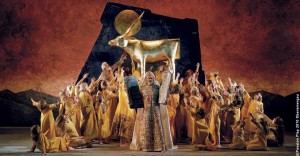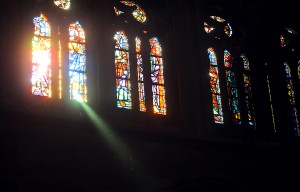 That is why the Lord’s anger burned against his people, and he abhorred his own special possession. He handed them over to pagan nations, and they were ruled by those who hated them. Their enemies crushed them and brought them under their cruel power. Again and again he rescued them, but they chose to rebel against him, and they were finally destroyed by their sin. Even so, he pitied them in their distress and listened to their cries. (Psalm 106:40-44)
That is why the Lord’s anger burned against his people, and he abhorred his own special possession. He handed them over to pagan nations, and they were ruled by those who hated them. Their enemies crushed them and brought them under their cruel power. Again and again he rescued them, but they chose to rebel against him, and they were finally destroyed by their sin. Even so, he pitied them in their distress and listened to their cries. (Psalm 106:40-44)
Let me list off a few of Israel’s disobedient actions is found in Psalm 106, that brought the wrath of God upon them:
- They became envious of God’s chosen leaders.
- They made a graven image, and worshiped it.
- They forgot how God saved them from Egypt, and the miracles He did on their behalf.
- They despised the promised land.
- They do not believe His Word.
- They joined themselves to false God, and offered sacrifices to the dead.
- They served other idols.
- They co-mingled with other nations.
- They even sacrificed their sons and daughters to demons.
Now remember, this is just some of the abominable acts done by Israel, just mentioned in ONE Psalm. And that is why He handed them over, to the pagan nations. Yet, even after Israel doing all those things, you read the above few verses, how He rescued them again and again, He pitied them, and heard their cries.
Have you ever felt abandoned; or maybe been suffering some pretty serious consequences of your sins. And you wonder if God will ever hear you again. But even in this dark time in Israel’s history, it says that He listened to their cries. And He will listen to you—He did listen to you. Why? Because Jesus died for your sins. In fact He heard you, long before you even spoke: He paid for you with the precious life blood of Christ, the sinless, spotless Lamb of God. God chose him for this purpose long before the world began, but now in these final days, He was sent to the earth for all to see. And He did this for you. (1 Peter 1:18-19)
Let me be even more plain, borrowing from the words of the apostle Paul: For I’m convinced that neither death, nor life, nor angels, nor principalities, nor things present, nor things to come, nor powers, nor height, nor depth, nor any other created thing, will be able to separate us from the love of God, which is in Christ Jesus our Lord. (Romans 8:38-39)
Take a line from the psalmist who wrote Psalm 106: Save us, O LORD our God, and gather us from among the nations, to give thanks to Your holy name and glory in Your praise. (v.47) Call upon him. He will hear you, and he will save you.

 You can see a drastic, neck-wrenching conversion between these two verses. And it’s a conversion in the wrong direction. Before these passages, the Psalmist was recounting the beginning of the Exodus, how the people rebelled, even from the start.
You can see a drastic, neck-wrenching conversion between these two verses. And it’s a conversion in the wrong direction. Before these passages, the Psalmist was recounting the beginning of the Exodus, how the people rebelled, even from the start. LORD is from everlasting to everlasting on those who fear Him, and His righteousness to children’s children, to those who keep His covenant and remember His precepts to do them. God gives a new and eternal nature when we love and obey Him.
LORD is from everlasting to everlasting on those who fear Him, and His righteousness to children’s children, to those who keep His covenant and remember His precepts to do them. God gives a new and eternal nature when we love and obey Him. Praise the Lord! Give thanks to the Lord, for He is good! His faithful love endures forever. Who can list the glorious miracles of the Lord? Who can ever praise Him enough? (Ps 106:1-2)
Praise the Lord! Give thanks to the Lord, for He is good! His faithful love endures forever. Who can list the glorious miracles of the Lord? Who can ever praise Him enough? (Ps 106:1-2) This psalm begins on a grandiose scale: Sing a new song to the Lord! Let the whole earth sing to the Lord! Nothing less than “the whole earth” is to sing to the LORD. The verses continue to crescendo until, in these final few verses, all of creation joins in the song. The heavens are glad; the earth rejoices; the sea and all its creatures shout His praise; the fields and crops burst with joy; and the trees sing.
This psalm begins on a grandiose scale: Sing a new song to the Lord! Let the whole earth sing to the Lord! Nothing less than “the whole earth” is to sing to the LORD. The verses continue to crescendo until, in these final few verses, all of creation joins in the song. The heavens are glad; the earth rejoices; the sea and all its creatures shout His praise; the fields and crops burst with joy; and the trees sing. This Psalm was written by Asaph, who was a Levite in the service of King David. He was also a drummer, and spent a lot of time serving before the ark of the LORD.
This Psalm was written by Asaph, who was a Levite in the service of King David. He was also a drummer, and spent a lot of time serving before the ark of the LORD. Strangers. Aliens. Foreigners. A political platform.
Strangers. Aliens. Foreigners. A political platform. So we’re driving on our way home after spending the afternoon walking around a modern art gallery, and now we’re talking about buildings. And my daughter says to me that buildings that have no windows have something to hide. (We happened to have been driving by a “business establishment” notorious for that sort of thing.) Then I responded that there are some churches in town that don’t have windows. And she says, “Hmm.” Now I know a couple of churches that fit that description, no windows, because they do lots of productions—you know, “Lights , cameras, action!”
So we’re driving on our way home after spending the afternoon walking around a modern art gallery, and now we’re talking about buildings. And my daughter says to me that buildings that have no windows have something to hide. (We happened to have been driving by a “business establishment” notorious for that sort of thing.) Then I responded that there are some churches in town that don’t have windows. And she says, “Hmm.” Now I know a couple of churches that fit that description, no windows, because they do lots of productions—you know, “Lights , cameras, action!” going on the inside. The other thing windows do is let in light, reminding us how important light is to us. And one more thing, they keep us from getting absorbed in our little (or big) box, because we can see what’s going on around us: people passing by who need Jesus; or seeing the trees, or the river, or the mountains clap for joy.
going on the inside. The other thing windows do is let in light, reminding us how important light is to us. And one more thing, they keep us from getting absorbed in our little (or big) box, because we can see what’s going on around us: people passing by who need Jesus; or seeing the trees, or the river, or the mountains clap for joy. How does worship affect you? Does it capture you heart, mind, soul, and flesh? It should. After all, if you love Him with all of your heart, soul, mind, and strength, shouldn’t His worship embrace you that deeply as well?
How does worship affect you? Does it capture you heart, mind, soul, and flesh? It should. After all, if you love Him with all of your heart, soul, mind, and strength, shouldn’t His worship embrace you that deeply as well? Life often pulls us in opposite directions. Verse 2 in this Psalm is actually repeated by David in verse 6. And reading it, you may get the sense that David is patiently waiting on the LORD, just being still. But between verse 2 and 6 are verses 3 and 4, and here we discover the context:
Life often pulls us in opposite directions. Verse 2 in this Psalm is actually repeated by David in verse 6. And reading it, you may get the sense that David is patiently waiting on the LORD, just being still. But between verse 2 and 6 are verses 3 and 4, and here we discover the context: I don’t want to draw an parallels between Israel as a nation and any other nation today or even in the ancient world. Israel has been and is unique. But the parallel we can draw is about the people He has chosen as an inheritance. Paul tells us in Romans:
I don’t want to draw an parallels between Israel as a nation and any other nation today or even in the ancient world. Israel has been and is unique. But the parallel we can draw is about the people He has chosen as an inheritance. Paul tells us in Romans: